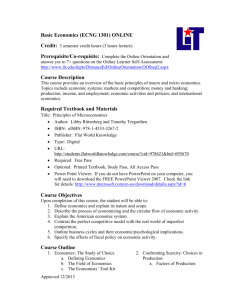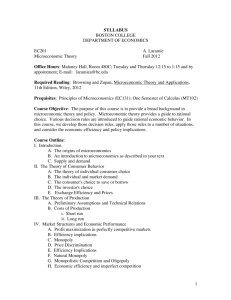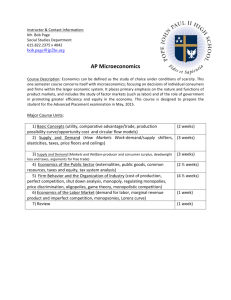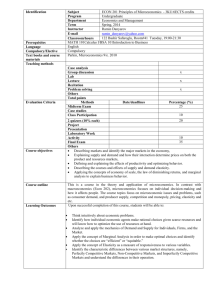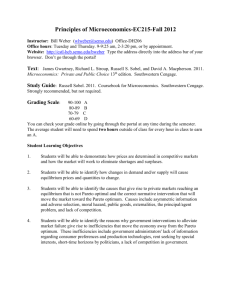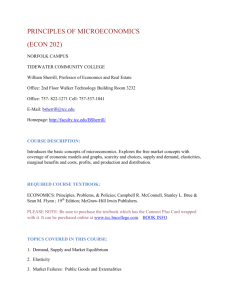Course Syllabus
advertisement
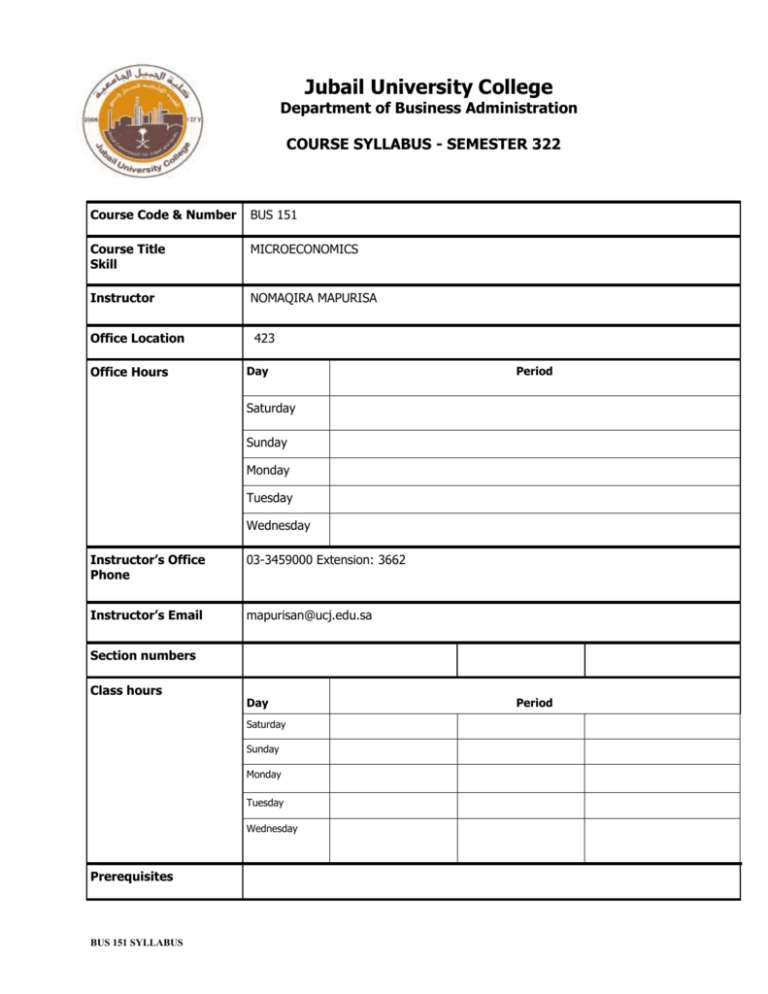
Jubail University College Department of Business Administration COURSE SYLLABUS - SEMESTER 322 Course Code & Number BUS 151 Course Title Skill MICROECONOMICS Instructor NOMAQIRA MAPURISA Office Location Office Hours 423 Day Period Saturday Sunday Monday Tuesday Wednesday Instructor’s Office Phone 03-3459000 Extension: 3662 Instructor’s Email mapurisan@ucj.edu.sa Section numbers Class hours Day Saturday Sunday Monday Tuesday Wednesday Prerequisites BUS 151 SYLLABUS Period Course Rationale This course aims to help students acquire a general understanding of the economic principles and theories which have been developed to describe how firms make decisions on production and input use, how consumers make purchasing decisions, and how firms and consumers interact in the marketplace under differing market conditions. Finally, this course investigates several causes of market failures and some of the policy measures that attempt to remedy them. Course Objectives Students who complete this course will be able to : Understand the scope of microeconomics. Understand the concept of an economic model. Be familiar with demand and supply curves Understand the concept of market equilibrium Be familiar with the concept of elasticity of demand and supply Be able to distinguish between normal, inferior goods and giffen goods Understand the average and marginal product of inputs Understand the idea of returns to scale Be familiar with the concept of opportunity cost Understand price taking behavior Be able to manipulate and solve diagrammatic and algebraic models of microeconomics Understand the limitations of the models studied Methods of Instruction Required Textbook Lecture Supporting Materials: Lecture notes, newspaper articles and case studies. Basic text: Principles of Economics: 2008.4th Edition. Gregory Mankiw; Thomson South Western References: Brue, S. L., & McConnell, C.R. (2005). "Microeconomics". (16th ed.). New York, NY: McGraw-Hill/Irwin. ISBN # 0-07-287561-5 Proposed Websites http://aise.swlearning.com Grading Scheme Assignment 1 & 2 Quiz 1 & 2 Midterm Final Exam – 20% – 20% - 20% – 40% Total 100% BUS 151 SYLLABUS Jubail University College Grading Scale Total Points Letter Grade A+ A B+ B C+ C D+ D F W WP WF DN I P Percentage 95-100% 90-<95% 85-<90% 80-<85% 75-<80% 70-<75% 65-<70% 60-<65% 0-<60% Withdrawal Withdrawal while Pass Withdrawal while Fail Denial Incomplete Pass Grade Point 4.0 3.75 3.5 3.0 2.5 2.0 1.5 1.0 0.0 N/A N/A 0.0 0.0 N/A N/A COURSE OUTLINE WEEKS WEEK 1 WEEK 2 WEEK 3 WEEK 4 QUIZ 1 WEEK 5 WEEK 6 Topics and Chapters Introduction to Economics Introduction and The 10 principles of Economics Chapters: 1 Introduction and The 10 principles of Economics Chapters: 1 Thinking like an Economist Chapters: 2 Market forces of demand and supply Chapter: 4 Market forces of demand and supply Chapter: 4 BUS 151 SYLLABUS Focus Basic vocabulary of economics People face trade offs Opportunity cost Rational people think at the margin People respond to incentives Trade can make everyone better off Market economy The role of government in the economy Standard of living Inflation Economic models The circular flow of income The production possibilities frontier Positive and normative economics Markets and competition Demand Types of goods Factors causing a shift in demand Supply Factors causing a shift in supply Equilibrium price WEEK 7 Elasticity and its application Chapters: 5 WEEK 8 Mid term WEEK 9 The cost of production Chapter: 13 The cost of production Chapter: 13 WEEK 10 WEEK 11 WEEK 12 Firms in competitive markets Chapter: 14 Firms in competitive markets Chapter: 14 Monopoly Chapters: 15 Quiz 2 WEEK 13 & 14 Monopoly Chapters: 15 WEEK 15 Oligopoly Chapter: 16 WEEK 16 WEEK 17 Monopolistic competition Chapter 17 FINAL EXAM BUS 151 SYLLABUS The elasticity of demand Factors affecting elasticity of demand The elasticity of supply Factors affecting elasticity of supply Total revenue, total cost and profit Economic profit versus accounting profit Production and costs Fixed and variable costs Average and marginal cost Cost curves and their shapes Economies and diseconomies of scale Characteristics of competitive markets Profit maximization in perfect competition Short run and long run equilibrium The firm's short run decision to shut down The firm's long run decision to exit or enter a market Characteristics of a monopoly Causes of monopoly Government created monopolies Monopoly versus competition Long run and short run equilibrium Public policy towards monopoly Price discrimination Characteristics of oligopoly Collusion and cartels OPEC and the world oil market Characteristics of monopolistic competition Short run and long run equilibrium position Jubail University College Policies Attendance 1. Attending at punctual time: Present otherwise the student is absent. 2. Late attendance 0 < 5 minutes: is late 3. Late ≥ 5 minutes: is absent Notes: (i) Every 3 late are counted as 1 absent 2 (ii) Every × total semester contact hours + 1 is DN 15 Grading BUS 151 SYLLABUS 1. Quality point: is the result of multiplying the credit hours by the grading points. 1. Semester GPA: is the result of dividing total quality points achieved in all courses at that semester by total graded credit hours of all courses in that semester. 2. Cumulative GPA in a semester: is the sum of total quality points achieved in all courses up to that semester divided by the total credit hours graded for all courses up to that semester

